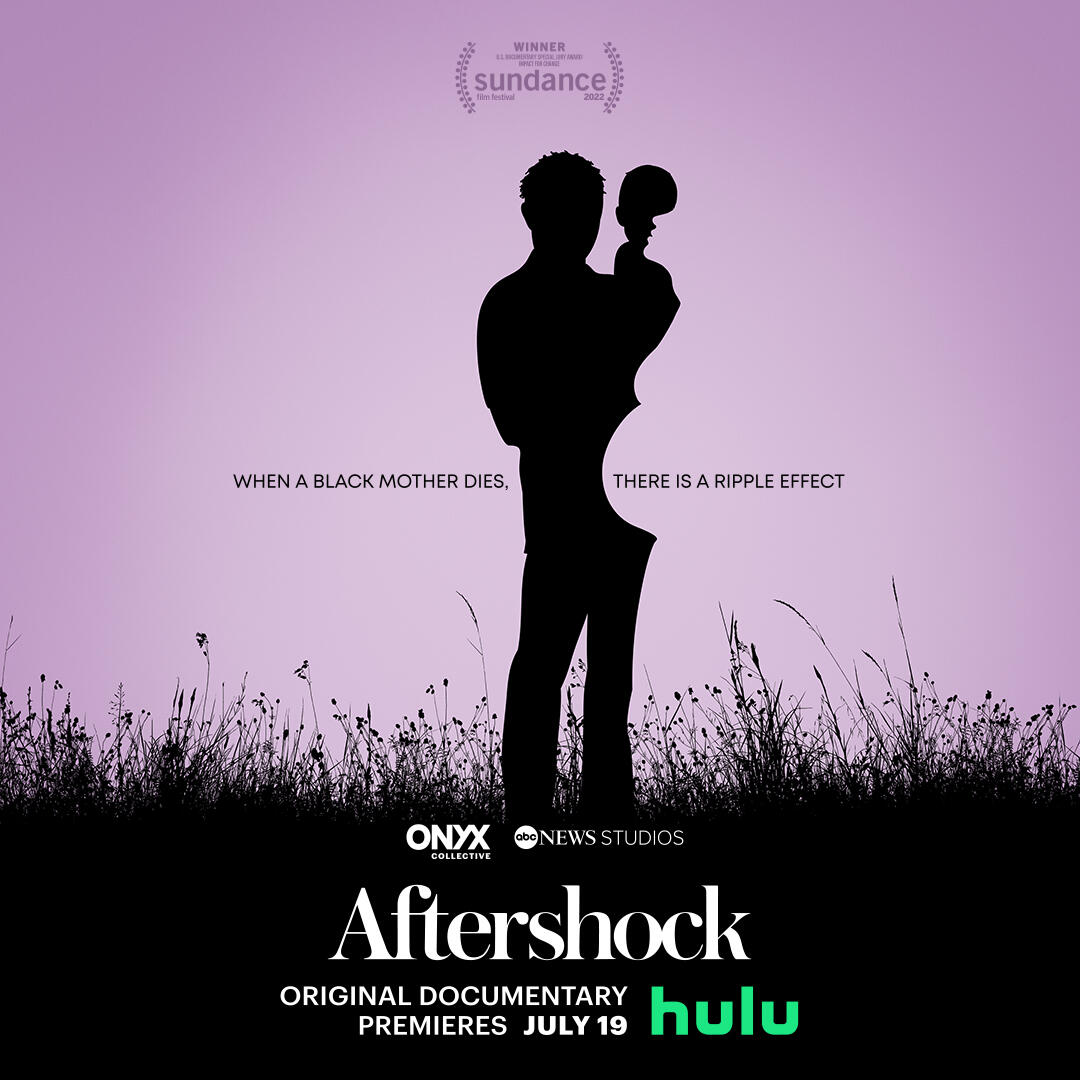A terrible and all-too-common incident involving Black women in hospital delivery rooms throughout the nation is the subject of Aftershock, a new documentary on Hulu. According to statistics, Black women with the same symptoms have a four times higher mortality rate than white women, as shown in the video. Viewers will learn about two of those ladies in Aftershock who, despite the greatest efforts of themselves and their families, passed away from issues related to their natal care.
Making viewers care a lot is a tried-and-true approach to shatter their hearts. “Aftershock” makes no effort to avoid doing that. Montages of two lives are used at the start of Paula Eiselt and Tonya Lewis Lee’s emotionally stirring and statistically unsettling documentary exposing the dramatically higher rates of maternal death and morbidity among Black women in the U.S. While giving birth in hospitals, Shamony Gibson and Amber Rose Isaac, two young, healthy ladies, passed away. A clear “speak her name” salvo is made by opening with scenes of the two inspiring, engaging young women.
One of the most effective ways for storytellers to link us to tragedies brought on by institutional failings is by focusing on who was lost and who they left behind. Shawnee Benton Gibson, Shamony’s mother, adopted the term “aftershock” to describe how she felt following her daughter’s untimely passing. It was a tidal wave. A tsunami struck. It was preventable. Isaac’s death was tragic and avoidable, and this was also true.
Omari Maynard, Shamony’s spouse, is now the sole caregiver for their toddler daughter and new baby boy after Shamony passed away in October 2019. When Amber Rose passed away from difficulties that had occurred before her C-section six months later, Bruce McIntyre III moved from being an expectant first-time father to being a single parent. The protagonists of the documentary are Maynard and McIntyre, who seek to hold institutions accountable and raise awareness of the disease that took their partners’ lives. The two young guys work together effectively to prevent such situations from occurring in the future and to let those who do experience them know they are not alone.
The maternal mortality rates in the United States are deplorable on the whole, but the effect on Black women, especially those with money, is alarming. Shawnee Gibson tells the leader of the Brooklyn organisation where Omari starts a group for Black men, “Knowledge doesn’t save you from this epidemic.
Magnetic and tenacious characters intent on altering such stunning figures exist in “Aftershock.” Charles Johnson attends a congressional hearing after losing his wife (the mother of his boys Charles and Langston). Working on health care fairness issues and procedures is Harvard Medical School’s Dr. Neel Shah. An introduction to the history of gynaecology and the medicalization of maternity care is given by veteran midwife Helena Grant. This relationship between gynaecology and slavery is nasty and predictable.
The fact that a chart comparing C-sections versus vaginal births reveals that C-section deliveries take less time, are less expensive, and result in 50% more money for the hospital is not shocking. Dr. Shah makes the comment, “You can understand what kind of incentives that may set up.”
Neel travels to Tulsa, Oklahoma, where the maternal mortality rate for Black women is significantly worse than the already worrisome national figures. LaBrisa Williams, the director of the Tulsa Birth Equity Initiative, is a community partner he encounters there. One of the greatest gifts of “Aftershock” is getting to know community leaders like Williams.
Felicia and Paul Ellis, a Tulsa couple expecting their first child, are worried. Knowing the statistics for both the country and Tulsa, as well as being chastened by Serena Williams’ account of her own attempts to persuade her doctors to take her pregnancy seriously, she declares: “A Black woman having a baby [in the hospital] is like a Black man at a traffic stop with the police.” Their trip is inspiring, illuminating, and charming.
The filmmakers are more intelligent than to create a presentation that starts with tears and finishes with a baby’s yawl. Shamony and Amber Rose are brought up again in “Aftershock.” Returning to Omari, Bruce, and Shawnee, the film tells the audience how they responded to an unimaginable tragedy with a rage of compassion and a cry for reform.
Shamony Gibson’s family is the first to share their story. Shamony passed unexpectedly after being ignored by medical personnel for about two weeks after the birth of her son. Aftershock’s production team followed the narrative of Shawnee Benton Gibson, Gibson’s mother, and her surviving companion, Omari Maynard, after Benton Gibson passed away. Due to subpar medical attention during an emergency c-section, Amber Rose Isaac would lose away just six months later. After learning the news, Maynard contacted Isaac’s bereaved companion, Bruce McIntyre, and the two formed a link to help elevate the stories of their loved ones.
The two families’ conflict is brought to light in the trailer as they are shown to be forever connected by their loss. The documentary will accompany viewers on the quest for justice through one-on-one interviews, footage of press conferences, marches, and sizable activism-based events. The voices of the focal families will be heard not only in the corridors of hospitals but also in the corridors of power.
Tonya Lewis Lee and Paula Eiselt (93Queen) are responsible for Aftershock’s direction and production (Monster). Dawn Porter, Jenny Raskin, Geralyn White Dreyfous, Patty Quillin, Jennifer and Jonathan Allan Soros, Tegan Acton, Emma Pompetti, Janet Tittiger, Davis Guggenheim, and Rahdi Taylor make up the executive production team.
Shamony Gibson, 30, tragically passed away in October 2019 after medical professionals failed to treat her 13 days after her kid was born. Two months later, we started recording Shawnee Benton Gibson, Shamony’s surviving mother, and her grieving partner, Omari Maynard, as they started to process what had happened and establish their new normal.
Amber Rose Isaac, age 26, passed away in April 2020 following an emergency c-section that, according to her family, was the result of medical malpractice. Soon after Amber’s passing, Omari contacts her surviving partner Bruce McIntyre, and the two develop a lasting friendship. Together, Omari and Bruce, with the support of their families and the community, start the struggle for justice for their partners while taking care of their kids as newly single parents.
Through the course of the movie, we watch how these two families become fervent advocates for maternal health, fighting for justice through law, medical responsibility, community, and the strength of art. Their work connects us to a wide range of individuals, such as the rising brotherhood of Black fathers who have survived, as well as the work of midwives and doctors who are working for institutional transformation locally. We find ourselves at the forefront of the burgeoning birth justice movement, which is calling for fundamental reforms in our healthcare and political systems.
On July 19, Hulu will release the inspirational and devastating Aftershock.
Where to Watch Aftershock (2022)?
Aftershock (2022) will be premiering on Hulu on July 19, 2022. We do not recommend illegal streaming and always suggest paying for the content you like to watch.
Is Aftershock (2022) available on Amazon Prime?
Amazon prime will not be streaming Aftershock (2022). Additionally, several other films are streaming on Prime. Our recommendations are The Voyagers, It’s a Wonderful Life, Notting Hill, and Eternal Sunshine of the Spotless Mind.
Is Aftershock (2022) available on HBO Max?
HBO Max will not be streaming Aftershock (2022). However, HBO’s subscribers can enjoy its other popular streams like Euphoria, When Harry Met Sally and Promising Young Woman.
Is Aftershock (2022) available on Hulu?

Aftershock (2022) is available on Hulu. The new release line-up additionally includes Pam and Tommy, How I Met Your Father, Abbott Elementary, and Vikings.
Is Aftershock (2022) available on Netflix?
Aftershock (2022) will not be available to stream on Netflix. However, other brilliant shows like The Power of The Dog, The Social Network, Tick, Tick, Boom, and much more are available.
